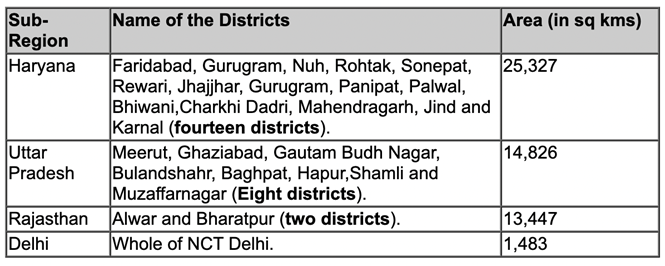In News:
- The NCR Planning Board had made public the Draft Regional Plan-2041 for the National Capital Region in October 2021.
- The plan is proposed to replace NCR Regional Plan – 2021 which came into force in 2005.
What’s in today’s article:
- About NCR (Formation, Areas covered, etc.)
- NCR Planning Board (Objective, Functions, Chairman, etc.)
- NCR Regional Plan 2041 (Key Proposals)
About NCR:

- National Capital Region (NCR) is a unique example of inter-state regional planning and development for a region with national capital – Delhi as its core.
- The region covers the whole of Delhi and certain districts of Haryana, Uttar Pradesh and Rajasthan, covering an area of about 55,083 sq. kms.
About NCR Planning Board:
- The National Capital Region (NCR) and its Planning Board were created under the National Capital Region Planning Board Act of 1985.
- Objective: To reduce immigration to National Capital Delhi through dispersal of economic activities and planed, coordinated and balanced development in the region.
- Functions:
- It provides assistance in framing projects for infrastructure development in the region.
- It provides loan assistance for implementation of the projects.
- Chairman: Union Minister for Housing and Urban Affairs
- Nodal Ministry: Ministry of Housing and Urban Affairs
NCR Regional Plan – 2041:
- Delineation of NCR:
- On NCR Delineation, consensus was arrived at the fact that the geographical size of the region should be a contiguous circular region of 100 km radius from Rajghat (Delhi).
- Beyond 100 km radius and up to existing NCR boundary, all notified cities/ towns along with a corridor of 1 km on either side of connecting Expressways/ National Highways/ State Highways/ Regional Rapid Transit System will be included.
- Urbanization of NCR:
- The draft report says 57 per cent of the total areas of the region will be urbanised by 2031 and 67 per cent by 2041.
- The report suggests that there is a need to create adequate peripheral roads to avoid congestion and reduce pollution in the region.
- The plan also recommended construction of two more regional expressways in addition to the Eastern and Western Peripheral expressways.
- Water Supply Management:
- The Draft Regional Plan 2041 suggests exploring possibilities of bringing seawater to Delhi-NCR through pipelines from the nearest source of seawater.
- This will help in meeting non-potable water requirements for large industries as well as commercial establishments.
- Multi-modal Connectivity:
- The Plan lays key focus on multi modal connectivity across NCR through air, road, rail and inland waterway connectivity.
- It proposes 30-minute connectivity through super-fast trains within major cities of NCR.
- It also proposes to explore feasibility of 30-minute Mass Transit Rail System from nearest NCR boundaries to Delhi.
- Reducing the number of vehicles:
- The draft plan puts special impetus on the development of bicycle and pedestrian facilities across NCR.
- It also stressed that the spatial spread of all new urban settlements should be decided based on having a 15-minute city (like Paris) concept.
- In this concept, all essential services and daily needs items are available within a 15-minute radius on foot, bike or non-motorised transport.
- The draft plan also emphasised making multilevel parking complexes a mandatory requirement for city centres with high rise commercial complexes, so as to make the region congestion free.
- No mention of increasing forest cover:
- The current forest area in the region is around 1,551 sq. km, 2% of the entire NCR area.
- Unlike the last two regional plans, the 2041 plan has set no specific target to increase the forest cover.









